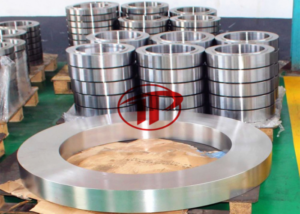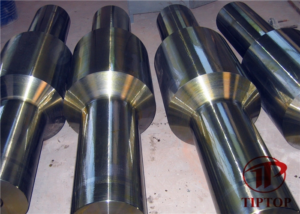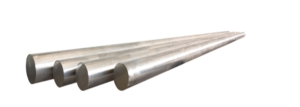AISI 4320
It is widely used for components requiring high strength, durability, and resistance to impact or cyclic loading. The alloy’s balanced composition makes it suitable for carburizing or case hardening, enhancing surface hardness while maintaining a ductile core. Below is a detailed breakdown of its properties and applications.
Descriptions
1. Chemical Composition
AISI 4320 contains nickel, chromium, and molybdenum to improve hardenability, core toughness, and wear resistance. Its composition is optimized for case-hardening processes.
| Element | Composition (% by Weight) | Role |
| Carbon (C) | 0.17-0.22 | Provides base strength; supports carburizing. |
| Manganese (Mn) | 0.45-0.65 | Enhances hardenability and deoxidizes steel. |
| Silicon (Si) | 0.15-0.35 | Strengthens ferrite and improves cleanliness. |
| Nickel (Ni) | 1.65-2.00 | Increases core toughness and impact resistance. |
| Chromium (Cr) | 0.40-0.60 | Improves hardenability and wear resistance. |
| Molybdenum (Mo) | 0.20-0.30 | Enhances strength,creep resistance,and hardenability. |
| Phosphorus (P) | 0.035 max | Controlled impurity (minimizes brittleness). |
| Sulfur (S) | 0.040 max | Controlled impurity (improves machinability in small amounts). |
| Iron (Fe) | Balance | Base metal. |
2. Mechanical Properties
AISI 4320 forgings are often heat-treated (e.g., carburized, quenched, and tempered) to achieve a hard surface and tough core. Properties vary based on processing methods.
| Property | As-Forged | Carburized &Hardened | Normalized | Test Standard |
| Tensile Strength | 550-700 MPa | 900-1200 MPa (Core) | 600-750 MPa | ASTME8 |
| Yield Strength (0.2% offset) | 350-500 MPa | 700-900 MPa (Core) | 400-550 MPa | ASTME8 |
| Elongation (% in 50 mm) | 20-25% | 10-15%(Core) | 18-22% | ASTME8 |
| Reduction of Area | 50-60% | 35-45%(Core) | 45-55% | ASTME8 |
| Surface Hardness | 170-210HB | 58-63 HRC (Case) | 200-240HB | ASTME18 |
| Core Hardness (Brinell) | 200-240HB | 28-35 HRC | N/A | ASTME10 |
| Impact Toughness (CharpyV) | 50-80J (room temp) | 30-50 J(Core) | 60-90J | ASTM E23 |
3. Key Advantages
Case Hardening Compatibility: Achieves high surface hardness (HRC 58–63) with a ductile core.
High Core Toughness: Resists impact and shock loads due to nickel content.
Fatigue Resistance: Ideal for cyclic stress applications (e.g., gears, rotating parts).
Uniform Hardenability: Suitable for large or complex forgings.
Cost-Effective: Balances performance and affordability compared to higher-nickel alloys.
4. Typical Forging Products
Case-Hardened Gears
Forged Camshafts
Differential Pinions
Heavy-Duty Bearings
Drilling Tool Shafts
Recent products
CONTACT US
Address
B-2007,Chuanmei Building,Taishan Street,Taian City,Shandong, China
Call Us
+86 0538 6368027
Email Address
Sales@tiptopforging.com
Applications
Heavy-duty bearings, spindles, and drive shafts.
Gears, camshafts, axle shafts, and differential components.
Valve stems, drilling equipment parts.
Landing gear parts, actuator components, and engine mounts.
Gearboxes, clutch hubs, and synchronizer rings.





